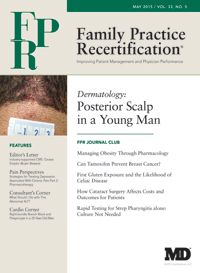Publication
Article
Family Practice Recertification
Strategies for Treating Depression Associated With Chronic Pain Part 2: Pharmacotherapy
Author(s):
Last month's Pain Perspectives focused on the benefits of psychotherapy in depressed patients with chronic pain. However, quality psychotherapy is not always available, and not all patients are open to it. This month, I will be looking at rational pharmacotherapy for the primary care physician in treating the depression that is generally an aspect of chronic pain syndromes.
Last month’s Pain Perspectives focused on the benefits of psychotherapy in depressed patients with chronic pain. However, quality psychotherapy is not always available, and not all patients are open to it. This month, I will be looking at rational pharmacotherapy for the primary care physician in treating the depression that is generally an aspect of chronic pain syndromes.
Antidepressants have certainly come a long way since I began my pain training. Most notably, our choices regarding the agents that we can use have increased dramatically. While this increase in options can result in more effective treatment, the myriad antidepressants now available can also increase clinicians’ confusion. Guidelines issued by the American Psychiatric Association recommend that decisions regarding which antidepressant should be prescribed need to be made “on the basis of adverse effect profiles, cost, and patient preferences” (1). These are all important considerations, although sound prescribing should go beyond this recommendation.
No two depressed patients present in the exact same manner, with heterogeneous phenotypes evident. Perhaps the most important distinction to be made is whether the depression is “agitated”, “retarded”, or “mixed agitated-retarded” (2). Likely symptoms of agitated depression may include anxiety, psychomotor agitation, irritability, distractibility, insomnia, and decreased ability to think and concentrate (3). Retarded depression (also referred to as “vegetative depression”) is likely to be characterized by hypersomnia, reduced physical movement, reduced speech, reduced sex drive, drowsiness, and reduced energy (4). Finally, mixed agitated-retarded depression is thought to be rare, and can include psychomotor retardation and agitation, as well as hypersomnia and insomnia within the same episode (5).
Although primary care physicians often have their “favorite” anti-depressant(s), matching the medication to the type of depression is important in order to obtain favorable outcomes. As antidepressants range on a spectrum from sedating to activating, this metric needs to be considered in prescribing — rejecting the notion of “one size fits all”. Tricyclic antidepressants (TCAs) are perhaps the most sedating class of antidepressant, and seem to be a logical choice in treating agitated depressed patients. Unfortunately, they are also associated with potential adverse effects and dosing complexities, resulting in primary care physicians’ reluctance to prescribe them (6). This is particularly true in regard to older patients, despite research indicating that adverse events associated with TCAs in elderly patients are no more common than with other classes of antidepressants (7).
As will be discussed in next month’s Pain Perspectives, TCAs have an important role in treating patients with chronic pain, and learning how to help your patients manage their side effects is an important skill to acquire. In treating vegetative forms of depression, more activating antidepressants are likely to produce better results. Activating antidepressants can be found in several classes, with strong empirical support available for bupropion and fluoxetine (8).
There really are no “rules” for antidepressant therapy, as any pill can do anything to any patient at any time. While antidepressant selection should not be performed randomly, , individual differences make prescribing as much of an art as it is a science. With the movement toward pharmacogenomic testing gaining traction, antidepressant prescribing will ultimately become more scientific (9). For now, however, failed trials will likely occur, and it is important not to give up easily. When a patient is refractory to antidepressant therapy, a psychiatric consultation should be considered. Irrespective, with practice, primary care providers can become extremely proficient psychopharmacologists in treating depression in their patients with chronic pain.
REFERENCES
1) American Psychiatric Association: Practice guideline for the treatment of patients with major depressive disorder (revision). American Psychiatric Association. Am J Psychiatry 2000, 157(4 Suppl):1-45.
2) Leventhal AM, Pettit JW, Lewinsohn PM. Characterizing major depression phenotypes by presence and type of psychomotor disturbance in adolescents and young adults. Depress Anxiety 2008;25:575-592.
3) Maj M, Pirozzi R, Magliano L, Fiorillo A, Bartoli L. Agitated "unipolar" major depression: prevalence, phenomenology, and outcome. J Clin Psychiatry 2006;67:712-719.
4) Rampello L, Nicoletti G, Raffaele R. Dopaminergic hypothesis for retarded depression: a symptom profile for predicting therapeutical responses. Acta Psychiatr Scand. 1992;84:552-554.
5) Zimmerman M, McGlinchey JB, Young D, Chelminski I. Diagnosing major depressive disorder: II: is there justification for compound symptom criteria? J Nerv Ment Dis. 2006;194:235-240.
6) Vos T1, Haby MM, Magnus A, et al. Assessing cost-effectiveness in mental health: helping policy-makers prioritize and plan health services. Aust N Z J Psychiatry 2005;39:701-712.
7) Coupland C, Dhiman P, Morriss R, et al. Antidepressant use and risk of adverse outcomes in older people: population based cohort study. BMJ. 2011;343:d4551.
8) Preskorn SH. Comparison of the tolerability of bupropion, fluoxetine, imipramine, nefazodone, paroxetine, sertraline, and venlafaxine. J Clin Psychiatry 1995;56(suppl 61):12-21.
9) Biernacka JM, Sangkuhl K, Jenkins G, et al. The International SSRI Pharmacogenomics Consortium (ISPC): a genome-wide association study of antidepressant treatment response. Transl Psychiatry 2015;5:e553.






